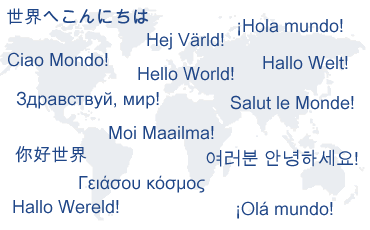In this post Liz from Pocket Cultures shares 5 tips on how to develop a blog that is friendly to those from around the world.

First of all, why do you want to blog for a global audience? Well, the world is getting more connected, and people in more and more countries are becoming active online.
PocketCultures.com had visitors from 83 different countries over the last month (note from Darren: here on ProBlogger Google Analytics tells me that visitors come from over 200 countries and territories) - some of you will have even more international readers. In December 2008 there were more Chinese than Americans online for the first time in history.
These trends are set to continue. So what does that mean?
You can keep up with the changing web demographic and increase your reader base more successfully if you take steps to adapt your blog for a global audience.
Here are 5 things you can do to make your blog more friendly to people from other cultures:
1. Use clear English
Most English conversations in the world don’t involve a native speaker, likewise many of your blog readers might not be native English speakers. Think about whether you have written clearly, or whether you can use simpler words and constructions.
For example, before I publish a post I go through it, asking myself for every idea, ‘is there a clearer way to write this?’
As a reader of ProBlogger you probably write in English but of course this applies if you blog in another language as well. Just substitute ‘English’ with your choice of language.
2. Offer translation options
Other languages on the web are rising fast. If you only publish in English you are missing out on a lot of potential readers.
The Italian actor and comedian Beppe Grillo publishes his blog in English, Italian and Japanese. As a result he is one of the most widely read bloggers in the world.
Let’s face it; most of us can’t go as far as translating our blogs, but an easier option is to put a translation tool (such as Google translate or a translation plugin) in a prominent place.
3. Write culturally aware
In other words don’t assume all your readers behave like you do. This is probably the most difficult point, because it’s hard to imagine what can be different in another culture when you haven’t experienced it yourself.
Increase your global awareness by reading blogs written by people in different countries – it’s a great way to find out about what’s different in other cultures. International films are another good way to get insights into other places and points of view.
4. Meet people on their own terms
With blogging and social media some people are more comfortable sharing personal information than others. Also, different cultures encourage different levels of sharing - what’s normal in one culture may be too much or too little information in another. People in some countries can even get in trouble for their opinions, including what they say online.
This means that some people you meet online may choose not to give away personal information and may seem guarded until they get to know and trust you. That doesn’t mean they are unfriendly, just that they feel comfortable taking things at a different pace.
5. The weekend is not always the weekend
In many Middle Eastern countries the weekend is on Thursday and Friday (including Saudi Arabia, Tunisia, Algeria) or Friday and Saturday (including UAE, Egypt and Israel). For maximum impact release your best posts on Monday or Tuesday, that way you can be sure the whole world is paying attention.
No comments:
Post a Comment